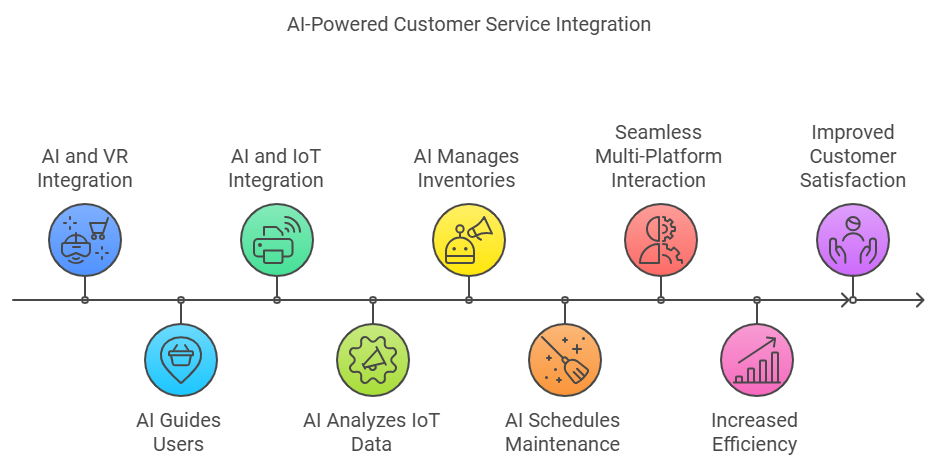 Businesses are continually looking for ways to enhance customer interactions and streamline service operations. AI-powered customer service is leading today’s business transformations. It revolutionizes how companies handle inquiries, improve response times, and personalize services. As AI technology advances, it allows organizations to efficiently meet and anticipate customer needs. This proactive approach greatly enhances the customer experience.
Businesses are continually looking for ways to enhance customer interactions and streamline service operations. AI-powered customer service is leading today’s business transformations. It revolutionizes how companies handle inquiries, improve response times, and personalize services. As AI technology advances, it allows organizations to efficiently meet and anticipate customer needs. This proactive approach greatly enhances the customer experience.
Below, we’ll examine AI’s role in customer service, focusing on its capabilities and strategic considerations. It addresses how businesses can fully leverage AI’s potential. Whether you’re beginning to integrate AI into your service protocols or refining existing systems, understanding AI’s impact is essential.
Overview of AI in Customer Service
AI-powered customer service refers to the integration of artificial intelligence technologies into customer support functions. This technology helps businesses streamline their operations and offer more efficient, always-available customer service. By incorporating AI, companies can automate routine tasks, allowing human agents to focus on more complex issues. The core technologies behind AI-powered customer service include machine learning, natural language processing (NLP), and automation.
Machine learning enables AI systems to learn from data and improve over time without human intervention. In customer service, this means AI can become better at understanding and responding to customer queries as it processes more interactions. Natural language processing allows AI to understand and generate human-like responses. This technology powers chatbots and virtual assistants that handle a wide range of customer service tasks, from answering FAQs to guiding users through troubleshooting processes.
Automation in AI-powered customer service speeds up response times and improves accuracy by handling repetitive tasks. For example, AI can automatically categorize and route support tickets to the appropriate department or agent without manual oversight. This seamless integration ensures that your customers receive timely and relevant help, enhancing their overall experience with your brand.
By leveraging these AI technologies, you can not only reduce operational costs but also improve customer satisfaction. This integration of AI into customer service is transforming how businesses interact with their customers, making the support process smoother and more effective.
Benefits of AI-Powered Customer Service
AI-powered customer service offers a multitude of benefits that can significantly enhance both your operational efficiency and customer satisfaction levels. One of the most noteworthy advantages is the provision of 24/7 customer support. With AI, your business can offer round-the-clock assistance without the need for human agents to be available at all times. This means your customers can receive immediate help whenever they need it, regardless of time zone or local business hours.
Additionally, AI-powered systems excel in scalability, especially during peak times. When customer inquiries spike, AI can manage the increased load without the need for you to hire more staff or extend hours. This adaptability ensures that customer service quality does not suffer during busy periods. Moreover, AI systems can handle a large volume of inquiries simultaneously, reducing wait times and preventing the backlog of requests that can frustrate customers.
Another significant benefit is the improvement in response times. AI-powered chatbots and virtual assistants can assess and respond to customer queries much faster than human agents. This speed in communication greatly enhances customer experience, as quick responses are often equated with better service. Furthermore, AI capabilities include personalizing interactions based on customer data. This personalization makes customers feel recognized and valued, as the service they receive is tailored to their history and preferences.
These enhancements not only streamline customer service processes but also improve the overall customer journey, leading to higher satisfaction and loyalty. AI-powered customer service transforms traditional support systems into more dynamic, efficient, and customer-friendly operations.
Future Trends in AI Customer Service
Emerging trends in AI-powered customer service are poised to revolutionize business interactions with customers. By integrating AI with technologies like virtual reality (VR) and the Internet of Things (IoT), businesses can create more immersive and intuitive customer experiences.
AI integrated with VR can make customer service more interactive. For instance, in retail, VR and AI can simulate physical shopping experiences for online shoppers. AI can guide users through a virtual store, offer personalized product recommendations based on shopping habits, and respond to queries in real time. This makes the digital shopping experience dynamic and personalized.
Additionally, AI’s integration with IoT devices offers significant enhancements to service delivery. IoT devices gather extensive data from their environments. AI analyzes this data to predict customer needs, manage inventories, and even perform remote troubleshooting. For example, in a smart home, AI could use data from IoT sensors to schedule appliance maintenance before breakdowns occur.
These advancements indicate a future where AI-powered customer service could seamlessly interact across various platforms, providing timely and context-aware assistance. This will not only increase efficiency but also improve customer satisfaction by delivering real-time, tailored solutions. As these technologies evolve, AI is expected to become a core component of customer service, reshaping how businesses interact with their customers.
Challenges and Limitations
While AI-powered customer service provides many benefits, it also presents several challenges and limitations that you may encounter. One significant challenge is the need for extensive data sets to train AI systems effectively. AI algorithms require large volumes of quality data to learn from so they can understand and respond to a wide range of customer inquiries accurately. Gathering and maintaining this data not only involves significant time investment but also raises concerns about privacy and data security.
Additionally, there’s the issue of losing the personal touch in customer interactions. AI systems, while efficient, often lack the empathy and understanding that human agents possess, which can be crucial in complex or sensitive situations. Customers may feel that they are interacting with a machine that does not truly understand their needs or emotions, which can lead to dissatisfaction.
Handling complex customer service scenarios is another area where AI can fall short. AI systems are excellent for dealing with routine queries but struggle with unusual or complicated issues that require creative problem-solving and human insight. In such cases, the interaction can become frustrating for the customer if the AI fails to comprehend the problem fully or provide a suitable solution.
Despite these challenges, AI-powered customer service is an evolving field. Ongoing advancements in AI technology are gradually addressing these limitations, improving AI’s ability to handle a broader range of situations and interact more naturally with customers. However, it’s important for businesses to balance AI tools with human agents who can step in when a more personal touch or complex problem-solving is needed. This hybrid approach ensures that customer service remains both efficient and empathetic, leveraging the best of what both AI and human support can offer.
Impact on Customer Satisfaction
The introduction of AI-powered customer service has significantly impacted customer satisfaction and engagement. By automating responses and handling inquiries swiftly, AI has been instrumental in enhancing service metrics across various industries.
A significant benefit of AI-powered customer service is its ability to provide immediate responses to customer inquiries. This rapid interaction contributes to higher satisfaction levels, as customers appreciate quick resolutions to their concerns. For instance, a report by Oracle noted that 80% of businesses using chatbots observed an increase in customer satisfaction rates. Furthermore, AI tools have enabled companies to provide 24/7 customer support, ensuring that help is available at any time, which is particularly beneficial in today’s global marketplace.
Moreover, AI-powered solutions have been shown to improve customer retention rates. The automated and personalized nature of AI interactions helps in consistently engaging customers in a meaningful way, making them feel valued and understood. For example, in the telecommunications sector, Sprint used AI to revamp its customer service, leading to a 30% decrease in customer complaints and a significant improvement in customer retention.
Additionally, AI has transformed customer engagement by providing personalized experiences. AI systems analyze customer data to offer tailored recommendations and support, making interactions more relevant and engaging. A case study involving a major online retailer demonstrated that implementing AI solutions led to a 35% increase in customer spending due to more personalized product recommendations.
In conclusion, AI-powered customer service has a profound impact on customer satisfaction by enhancing response times, availability, retention rates, and the personalization of customer interactions. As these technologies continue to evolve, they promise to further refine and perfect the way businesses engage with their customers, potentially setting new standards for customer service excellence.
Ethical Considerations and Best Practices
The integration of AI into customer service introduces several ethical issues that businesses need to manage carefully. Privacy concerns are especially significant as AI systems in customer service often need extensive personal data to operate effectively. Transparency about how AI interactions happen is also vital. Customers should know when they are dealing with AI, what data is used, and how.
Businesses must follow strict data protection standards to address these concerns. This involves ensuring all data collected by AI customer service technologies is secure and complies with data protection laws like GDPR in Europe or CCPA in California. Clear, accessible information about data practices should be provided to customers.
Additionally, it’s crucial to maintain transparency in AI operations. Informing customers when they are interacting with AI and offering a human interaction option builds trust and views AI as a supportive tool, not a deceptive replacement.
Regular audits of AI systems can help identify and address biases in AI algorithms. These biases could unfairly treat certain customer groups, damaging your brand’s reputation and trust. Training AI with diverse data sets and involving diverse teams in AI development can help mitigate these biases.
Conclusion
AI-powered customer service is rapidly changing how businesses interact with their customers. It offers benefits such as increased efficiency, availability, and personalization. Yet, it also brings challenges, including ethical concerns and the need for careful integration into current frameworks.
As you move forward, balancing AI’s innovative capabilities with core human values is key to success. Ensure transparency, protect privacy, and maintain an ethical approach to AI deployment. This strategy will help you not only meet but exceed customer expectations. Additionally, keeping up-to-date with AI advancements will allow you to continually refine your customer service strategies.
In conclusion, AI-powered customer service isn’t just about automating processes. It’s also about enhancing customer interactions and deepening relationships. As this technology advances, your strategies should evolve too, always aiming to boost customer satisfaction and loyalty. By embracing AI responsibly and thoughtfully, your business will thrive in the digital age and remain competitive in a fast-changing market.


